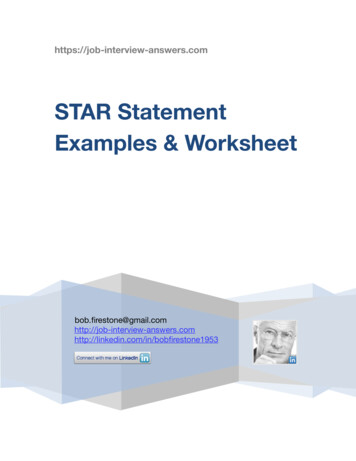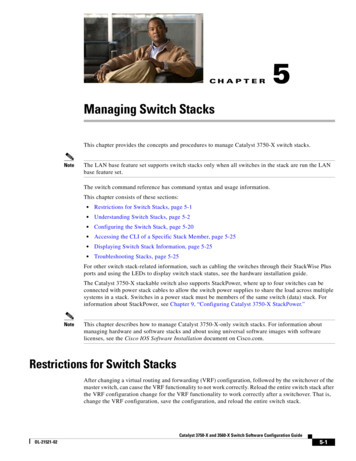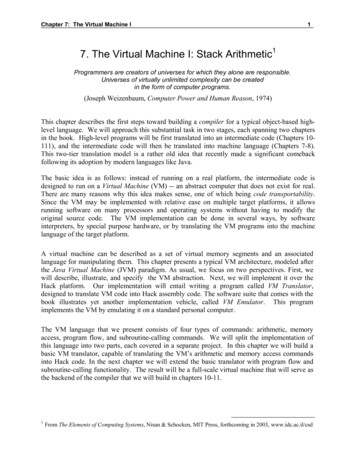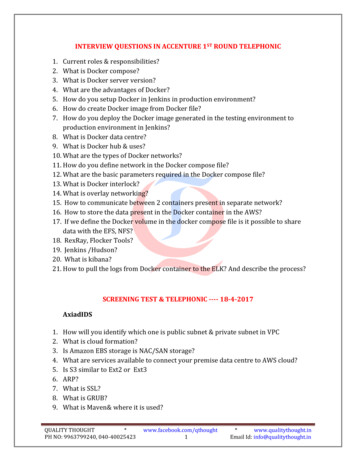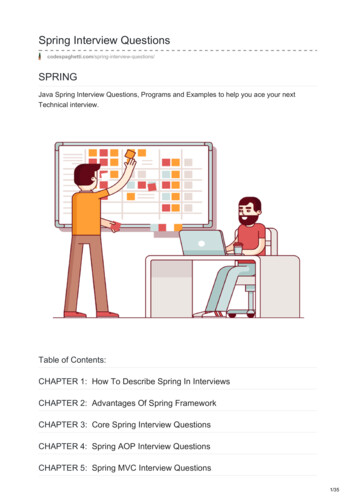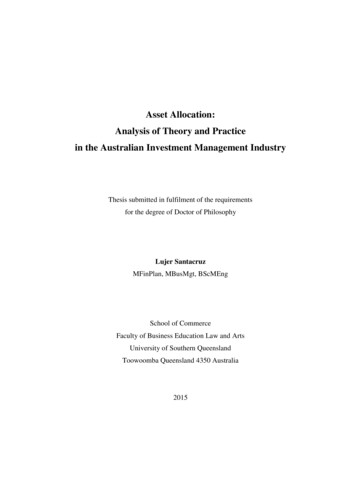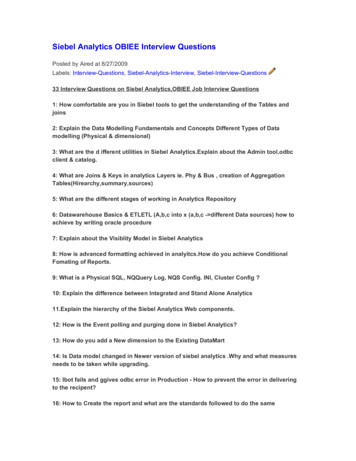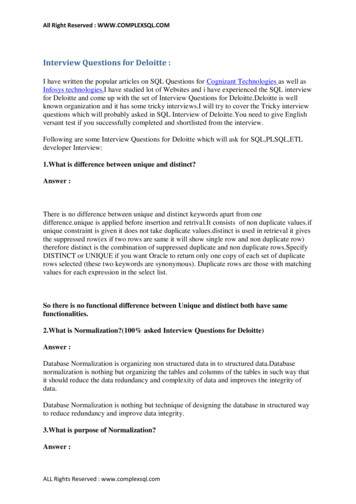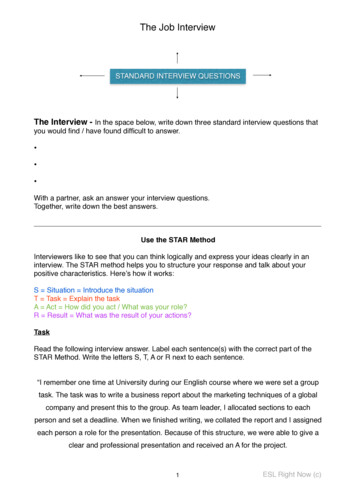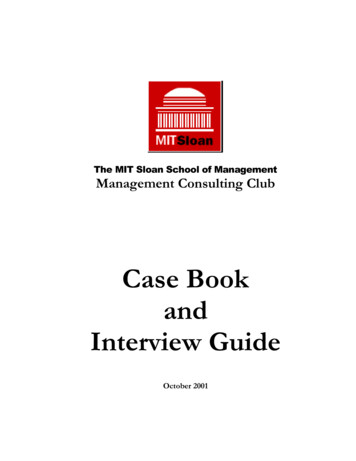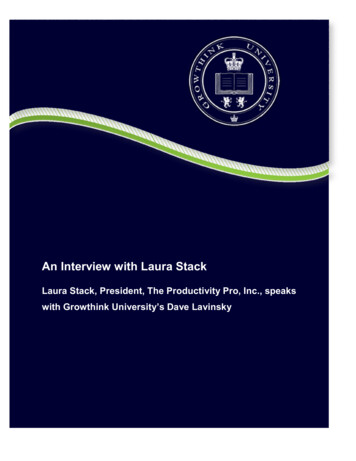
Transcription
An Interview with Laura StackLaura Stack, President, The Productivity Pro, Inc., speakswith Growthink University’s Dave Lavinsky
Dave Lavinsky:Hello, everyone. Dave Lavinsky here from Growthink. Today I’m very excited to be able tointerview Laura Stack. Laura Stack is a personal productivity expert. She is an author and also aprofessional speaker. She is the president of The Productivity Pro, Inc., a time managementtraining firm specializing in productivity improvement in high stress organizations.Laura is the best selling author of four published books. Her newest book called, “SuperConfident” will hit bookstores in spring 2010. Her other works include the “The ExhaustionCure,” “Find More Time,” and “Leave The Office Earlier,” the latter of which was hailed as thebest of the bunch by the New York Times. Laura has also been a contributor to two of thepopular “Chicken Soup for the Soul” books.You can find more information about Laura’s company and her books online atTheProductivityPro.com. So Laura’s website is the TheProductivityPro.com, and if you Google“Laura Stack” or go to Amazon, you will find a lot of the books that she’s written.Because maximizing productivity is so absolutely essential to success as an entrepreneur, I’mthrilled today to have Laura Stack as our guest. To begin, Laura, thank you so much for takingthe time to speak with me today.Laura Stack:It’s my pleasure. I appreciate being here.Dave:Excellent. So Laura, the first question I have for you is - If you were to audit an entrepreneur atwork and you were to watch them, what would be some of the telltale signs that they are notbeing as productive as they are capable of?Laura:If I can actually watch them! I indeed do watch people - often - if I am invited into an office to dosome consulting work with the team, with a small group of people, or an individual. There seemsto be a typical pattern to the day and I think entrepreneurs are more guilty of this than mostbecause we have more control over our time.What I see a lot is this kind of “get to work and ease into the day.” I call it the “beverage ritual.”There is this you know, “get my beverages, get settled.” There is this socializing ritual where wekind of catch up with a couple of folks in the office. And then there is the email ritual, wherepeople get sucked into that vortex for a couple of hours. And now what time is it? Oh, it’s lunchtime. We go to lunch and now our energy is really low. We don’t have the ability now to work onthat proposal, or the project, or the presentation, or whatever it was that really needed to takeour time. So we go “Ah, I’ll get to that tomorrow.” Tomorrow, we repeat the same cycle. I thinkbecause we have so much freedom in a way that we spend our time that we are susceptible tocycle more than others.
Dave:That is a great point about entrepreneurs - they have that freedom. They are their own bosses,so they don’t have anyone dictating what they have to do with their time. So you’re saying thatit’s very easy to fall into these rituals – that they do these things that do not necessarily have thehighest value out of their time.Laura:And that’s the problem – there really is no accountability to anyone but yourself. Self disciplinefor many entrepreneurs is a big issue because I really believe that most of us – I’ve been inbusiness now for 17 years - and I know many of the people listening to this have been inbusiness longer than that. Most of us know - based on our past successes - exactly what weshould be working on. I don’t think that the problem is that we don’t know what to do, we don’tknow how to work hard, or we don’t know how to make lists and check stuff off. All that stuff weknow how to do. I just think that there’s a lot of things that keep us from doing what we know weshould be doing. This is a huge guilt area with many entrepreneurs because we sit there andour minds we are “Ah, I really need to be doing this right now” but we just can’t seem to getourselves past our own I don’t know the right word for it We don’t have inertia. We need more inertia. And so I think we kind of just sit and waste a lot oftime.Dave:Got it. So what would be the first step that you think an entrepreneur should take to becomemore productive? Because they what needs to be done and they are doing these things - theyare stuck in these rituals. What is the first thing that you would suggest a typical entrepreneur do?Laura:I think a successful day starts before you get there. Part of the problem is that, we get to workand we don’t really have a clear idea about what the day is going to look like. So the first thingyou have to do is decide that you have to take control. We tend to let our days to be dictated byother people - by our staff, by clients, by phone calls, by crises.In other words, if don’t determine what you want to accomplish that day, pretty much everybodyelse is going to figure it out for you. We have to start the day already having a plan. Now ofcourse, it does not always go exactly the way you hoped.It’s not like you’re going to sit down and write out your day. That’s really old school timemanagement. You’re not going to do, you know, “From 8:00 to 8:30, I’m going to do this. From8:30 to 9:00, I’m going to do this.” This is not what I’m talking about. I’m saying that before youleave work each day, when you’ve called it a day, the best thing that I do for myself is to say,“Alright. I’m going to think about tomorrow. Tomorrow - when I leave work - what is the one ortwo most critical things that I need to accomplish for value for my business?” I look at what aremy most strategic and profitable activities. Once I’ve figured out what that is, I want to make
sure that I do those things first. When I do have a block of discretionary time - whatever thatlooks like – I’m going to do that first.So if it means not checking my email You know, for me, if I’ve already checked my email at 5o’clock, the odds at 8 o’clock in the morning that I’m going to have something that is moreimportant than what I’ve already decided as my most critical activity for the day - the odds ofthat are very low. And so, not even looking at your email, until you feel like you haveaccomplished something for the day.I’m a morning person. I have my most creative periods of time in the morning. That’s when Ireally want to do really high value, high concept, thinking types of tasks - difficult financialdecisions or coming up with proposals, anything creative, any kind of brainstorming. You knowI’m not able to do that in the afternoon. This is the process that you have to follow in figuring outwhat you’ve got on your plate, when are you at your best, etc. In other words, purposefullyconfiguring your day and protecting your time. Because you can!And then obviously the self discipline. It kicks in because you know if you don’t do that task thatyou’ve planned, that activity probably isn’t going to happen or will take a while longer.Something that could have taken you a half hour when you have high brain power could takeyou two hours if you attempt it in the afternoon. So you have to be very purposeful about howyou structure your day.Dave:Got it. So you’re saying that prioritization alone could save you time because there are certainthings you can get done faster when its prioritized and done on the right time of the day.Laura:I don’t think we match - necessarily - our rhythm to our activities. A lot of entrepreneurs confidethat “Oh, I’m a procrastinator,” or “I’m just not motivated,” or “I’m lazy.” I don’t really think that’strue. Most people wouldn’t be successful in their businesses for as long as they have if theywere lazy or not motivated.The problem is that the symptoms of procrastination are very similar to the symptoms ofexhaustion, for example. If you simply don’t have the energy - the mental energy to commit todoing something higher order – then it’s counterproductive to even attempt it. You know duringthose times of the day when you just read and read something? You know what I mean – whereyou read it over and over? You can’t get your brain around it. Not productive.So realizing the natural rhythm of my day is and trying to work around that is going to be a lotbetter if you know that you are at your peak at 10:30. Try to schedule your client calls then – youknow, times when you’re going to be on your game and up. Work everything else around that. Ifyou know that you’ve got to get a PowerPoint show done, and you’re going to need someextreme focus and concentration, and you know at 2 o’clock you get a good surge, that’s whenyou plan on doing that.
You have to protect you time. It means, yeah - not checking your email. Out of every 10 emailsyou get, maybe about one is important. But whenever we get one, we have an alert. It makes nosense. We’re checking them as they’re coming in for every newsletter, you know, linked inmessage, etc. It’s all that stuff that at the end of the day we discover, “Gosh, I didn’t getanything done!” So you have to be very purposeful about how you create your world and whatthat flow is going to be for you.Dave:Excellent. Pushing back to what you said initially about the rituals. You covered the “email ritual”where you say, definitely don’t check it every time. Just check batches and you’ll save a lot oftime over a day’s period. What about the other rituals like socialization, the beverages, etc.? Doyou think that entrepreneur needs to cut down on that? What’s the solution there?Laura:No. Just have it done before you “start.” Because some of us are home-based. So, “Oh, I thinkI’ll get a cup of coffee.” It’s really easy to wander in the kitchen. But you already have gone toStarbucks.The problem is, we don’t have to clock in and clock out. Normal people with a “job“ who startwork at 8 o’clock - they’ve already gone through the Starbucks drive through at 7, and theyshow up. And now, they’re on the clock. We have this sense of privilege of “I’ve earned this.”You know, “I deserve this.” My response is, you know what? Provide a little structure for yourself.Create your own personal rules. If you were your boss, would you hire you based on yourperformance and behavior and how you slack off and waste two hours of your day? I don’t godo personal things during my day. Some of my colleagues do.I have colleagues, that are, you know, “I’ve worked hard. I’ll get my nails done. I’m going to goshop. I’m going to go golf.” Once in a while, that is ok to do that. Once a month, I’ll go get amassage, but not every day. Not as part of this routine or ritual that you’re in.So pretend like you have a job. Have a lunch hour. Have a start time. Have an end time. If youdon’t, now you’re the one who’s staying late, ignoring your family, not spending any time withyour spouse. We have to create artificial bubbles around ourselves. I’m not saying that allsocializing is a waste of time. I don’t want you to hear me say that.You know, you do have to talk to people and build relationships with them but you can tell,though, after you’ve been chatting with someone - five minutes is fine. But 20 minutes? You’reprobably using it as a way to not start on something that you know you need to work on.I think that part of it is kind of introspection - looking at, “Am I doing this by design?”Is this something that is part of this overall strategy where maybe I’m mentoring someone - andon purpose? I’m trying to go and connect with them and say, “Hey, here is something that
happened, and let me show you how I handled it in case it should ever come up again.” Versusif you’re doing this by default.You’re just defaulting to these really bad patterns and bad habits. And I know a lot of us talk toourselves and go, “I really shouldn’t be doing this right now.” We have to listen to that innervoice and that intuition and look at where we’re wasting time.Dave:Great points. Thank you.Now, you start mentioning mentoring. One of the questions I have has to do with delegation. Ithink that a lot of entrepreneurs - when they are working by themselves where they have a verysmall office - they don’t delegate enough and they end up doing a lot of low-value tasks. I wasjust wondering, what are your thoughts on delegation and things that should and should not bedelegated?Laura:I think that in general, entrepreneurs are guilty of not delegating early enough and often enough.You know, there’s this kind of “I have to hang on to my money” kind of mentality. And what I findover and over is that the more you delegate and hire it out or outsource, or put on a staff person,or virtual assistant, whatever you can handle financially - the more you pay some those whatyou call lower value, lower-level tasks, as you described it, taken out of your plate, business willgrow commensurately. I’ve seen people who have been stymied five, six, seven years into thebusiness at a place they should have been at year two had they just done things differently. Imean, of course you’re able to put a mail-in together. Of course you can send out email blastsand post your social media. A lot of us are here – we started our companies - because we gotfrustrated with all the other people is regular jobs. And we’re like, “Oh, get out of my way. I cando this myself.” But just because – you know, I have an MBA. I can do accounting. I know howto do bookkeeping. But you don’t see me sitting there on my computer entering my credit cardreceipts myself. For the measly 200 or whatever it cost me a month to have someone twice aweek pick up all that junk and handle payroll and IRS Just because you can do it, doesn’tmean you should.I think for most business owners, we have to look at a realistic view of what we are able to do.You think, “Oh well, only I know how to do it 100% right. If I give it to someone, they’re going toscrew it up.” We hold things really tight to our chest rather than saying that, “Okay, is this person80% capable of doing this as I am?” You have to push task down to the lowest commondenominator.I look at people who have too many things on their plate. Well, you either don’t trust your people,or you don’t have the right people in place, or you’re a control freak! Which is it? We have totake a look at people who are working 60, 70, 80 hour weeks, and maybe when you are startingup in the first year, that’s going to be the norm. But after that, there’s something wrong. Whetherit’s the strategy or finances or what have you. You have to get some of those operational day-to-
day mundane tasks off your plate and focus on higher end strategic types of decisions that arereally going to propel your company forward.So many people get caught in that daily fire fighting that they never have time to sit down andthink long term.Dave:That’s a great point.Just some personal stories. When I started to get serious about time management andproductivity for a week, I kept a list of the things that I was doing that I felt I probably shouldn’tbeen doing. Things like going through the mail. I think I was doing payroll at that time. It sort ofhits you after a week and you have this list of 20 things that you probably shouldn’t have done.Are there any other techniques like that you suggest people use?Laura:I see people emailing others outside of their organization, like clients or prospects. Or maybe wehave to coordinate a group of four people to get on the phone and discuss marketing or aproposal. They are doing this email volleys like, “Okay, I can do this time and this date or thistime at this date. Some Yahoo and they reply to all, and now there’s like 27 crazy email stringson just one mundane issue. That is one thing know that personally makes me a baddie.So number one, you have to become familiar with third-party applications that automate some ofthese processes for you when people are not in your office - on your server, so to speak,running exchange. Programs like doodle.com allow you to create meetings that poll participantsusing their email address on what would be a good day and time, and you can offer like three orfive different alternatives so people can check yes or no. But see - you should not even be doingthat yourself. If you back that process up, how can you use an assistant who could send out thatpoll, find out when people are ready, here is Laura’s schedule, you know? Figure out how to useOutlook. Some people – you know, I’m a Microsoft Certified Specialist in Outlook. I teachOutlook, and nobody know how to use it. Most people know 10 to 20 percent of its features.So people waste time cutting things from their calendar, and scheduling tasks. All those thingscan be done if someone is sharing your mailbox.Those are the things you really have to Even the small things that you think “That’s just goingto take a minute,” that scheduling that meeting can end up taking an hour by the time you aredone.So I like your idea about keeping a log. I have a time log form. If anybody would like to try it, it’son my website under the “resources” menu. They can look for the “free resources.” There’s atime log similar to that they can download and fill out. It takes about 10 minutes a day, but I thinkthat’s a really great discipline. When you force yourself to really be able to step back from it andlook objectively at where your time went, who interrupted me, what was the crisis? What was itfor? Could I have prevented it? Is someone else capable of doing this?
Am I procrastinating? Have I not trained them? I think you have to have some good data beforeyou can really ascertain specifically what those areas are that you can tighten up and delegate.Dave:Excellent. I would just like to stress once again all the things we are talking about – the hoursspent scheduling the hour meeting – these are just more hours and minutes that you are notspending on the high level stuff - marketing your business, expanding your business, growingyour business.Laura:That’s right. You need to be figuring out how to spend 80% of your time on business activities.That are going to move your company forward and bring in revenues - marketing, talking withclients, serving customers, prospecting. The things that you need to do to bring in the box. Andit’s so easy to do the fun and trivial stuff like scheduling a meeting. It needs to be done - but itdoesn’t need to be done by you.Dave:Excellent. Great point. I have a question for you about multitasking. There are those that believethat there is no such thing as multitasking. You just cannot do two things at once. But I alsoknow a lot of entrepreneurs that have so many things going on at once. It’s hard not to. I justwant to get your thoughts on multitasking.Multitasking is kind of a misnomer. It’s more complicated than that because you have to reallylook at the neurology portion of it.When you are talking about doing a task consciously and focusing on doing something - forexample typing an email - you literally cannot do more than two conscious activities that a time.For example if someone poke their head in your office and says, “Hey you got a minute?” Youcan’t focus on what that person is saying and pay attention to them while at the same timetyping your email.And so what we do - and this is where people call it multitasking – it’s actually switching. Weswitch back and forth. We type a little, listen a little, type a little. Of course you are not beingeffective in either one, really. And people can kind of tell that you are not listening if you’retyping while they are talking to you because, well, you’re not. What we really want to distinguishbetween are the focus and the level of the task.So for example, if you are installing software. You’re installing software on a client’s server. Youcan let that go while now switching to do something else. That’s what we are talking about - wehave multiple things that are kind of “up in the air” at the same time. We are waiting for aresponse from this person, and we are waiting for a call from this person. What happens is weswitch a lot of times during the day. And that is actually a necessary business skill - to be able tohandle inputs as they occur. The challenge is a lot of us have these artificial inputs that we’vecreated in our world.
We haven’t gone into our email software and gone through the tools. And you know, in Outlook,for example, in “advanced email option,” it says, “When new items arrive in my inbox do thefollowing.” Do you know that there are four alerts? It plays the sound, it places an envelope inthe system tray, it puts up a new desktop alert, and it changes the mouse cursor for every singleemail. It’s no wonder, this is like Pavlov, you know?There is this obsessive compulsive nature to this stimulus that we’re allowing. So going andturning off what are called the “global alerts” but then turn on an alert for important people. Inother words, I don’t want to know about every email coming in. But if my best client emails me, Iwant to know about that right away. But if my assistant emails me, or my husband, whatever it is- then I can play a sound or put up an alert.These alerts - whether it’s our blackberry, our instant messaging, our phone going off,something buzzing on the desk - we don’t have the ability anymore to focus. As we respond tothese various distractions, what’s happening to the one thing that you should be working on? It’snot getting done. So we have to create these kind of bubbles around ourselves when we are like,“Okay, I’m going to do this proposal. If you cannot resist checking – if you are so responsive toemails - shut the whole thing down. Close your email program. Turn off your phone. Forwardyour regular phone. Put your instant messaging on “do not disturb.” There just too many ways toget bothered with today’s environment. That will allow you to stay focused.Dave:Got it. Do you believe - let’s say you have to do that proposal. In your mind you know it’s goingto take you an hour. Would you really put yourself in a real bubble by turning off the phone,closing your outlook, putting a note on your door that says “Please do not disturb,” or Laura:Oh yeah, I will go that far. I find that my door no longer works, because people just knock on itanyway. We have these what we call cube doors and it’s a little tape that just zips across theentrance and clicks on the other side, and it says “Caution: Productivity Pro at Work. Do NotDisturb”. Everybody understands that okay, if you have a client on hold and then you have areally pressing question and you need me right now - like somebody is bleeding – okay, thenyou can interrupt me. But if this is just something to ask me about a meeting in two weeks orwhatever, please respect this signal that I am head down and focused and trying to concentrate.You have to do it with your technology. You have to do it with your staff. You have to do it withyour schedule and make sure that you don’t have any other conflicts. Some people just block itright out of their calendar. They know that they do their best work from 10 to 11. Schedule anappointment with yourself so that when someone calls in, your assistant can say, “She has anappointment during that time. How about 11:30?” It doesn’t matter that it’s an appointment withyourself to get work done. They don’t need to know that and they don’t care. The point is youhave to take more control around creating that bubble - that environment. And your brain. Youhave to control your brain. You sit down to work on the proposal, then your brain goes, “Hey, did
you remember to fax back that contract and so forth?” You know - don’t get up and do it. A lotof time we just obey this kind of mind traffic.You get up, you go over, you fax. You sit down and you’re like, “Where was I?”You just have to get off this on, off, on, off switch going in your poor brain. Where you can’treally ramp up into a state of flow or concentration. And so when you think of something, don’tactually do it. Don’t go flying off in a bunch of different directions. I call these people butterflies.They kind of flit over here and flit over there. At the end of the day, they’ve got 17 little thingsdone but they didn’t actually get the proposal completed. So now they buy themselves a latenight because they screwed up their day. So write the things down. I use the expression, “If youthink it, ink it” rather than actually doing it. Then when you are done, here are the list of thethings that you thought off.Dave:Got it. And in the beginning, you said, you start with that prioritization. I guess you write downthose little things, but you still want to get those big things done first. Is that correct?Laura:Well that’s - whatever one or two things where you set by the end of the day. Tomorrow, whatare the one or two most critical tasks that I would have to have completed in order for me to feellike this is that this is a productive day? When you are working on those, do not allow otherthings to fly into your time. Just stop, write it down, go back to I am doing. And your brain will fireup five, six, seven of those before it actually clears itself. Our poor brains are always used toworking 700 miles an hour. We’re just constantly revving as entrepreneurs.And so when we finally just sit - and now I want to focus - the brain goes whoops, I got a second.It tries to fire off a whole bunch “by the ways,” “don’t forgets” - the little reminders that are inthere.You have to be patient with that process as your brain fires off the first few things. Write it downand now you will be free to get ramped up on that task.Dave:Got it. Excellent. Do you have any sort of tools that you use? You mentioned using Doodle as acool online tool for meetings. I assume that there are a lot of tricks that you use in Outlook. Arethere any other places that you use for your to do lists, or you tasks, or any sort of a littleproductivity tool that you use?Laura:A lot of people use Google Docs, and other tools with Google. I personally love Outlook, I usethe Outlook task list. I use the journal to document communications with clients and contacts.The problem is a lot of people don’t really know how to use it. They don’t know, for example,that you can pull off contact and you can click their activity and you can see every email that
you’ve ever sent. You’ can see every meeting that you’ve ever attended – you know, the tasksthat you have for that person. You just have to set up those linkages correctly and if you getsome training on how to use some of the tools I think we are always looking for a tool but weare not using the ones that we have.I have some favorite little other software that I use. I use RoboForm.com - it helps youremember all those passwords whenever you logon to a website where you need to sign in. Itremembers all your login IDs and passwords for you. Its huge time saver.You know, because everyone is a little different. They want this character or that. So you open awebpage and click one button and it fills in everything for you.I like ShortKeys.com. It’s a text replacement utility and it uses the number sign hit twice. So yousay, “number sign (#)” “number sign (#)” and then a short key - whatever it is. So the short keyfor example in mine is “SIG” is signature. So if I type in ##SIG, boom - it puts all my contactinformation, and phone and street. Anything that you type over and over again - like your emailaddress. Mine is ##L is laura@theproductivitypro.com . What’s beautiful about that is you canbe anywhere. You can be at any document and any software, on any webpage, and fill in - youknow, if you’re always typing in your credit card - ##CC types up my credit card. It uses amaster password. Of course, it’s a big hairy password, nobody is ever going to be able to guessor hack into to unlock those passwords each day.You do have to find kind of the right mix of software that allows some of these efficiencies.These third-party types of plugins. But it’s also imperative to understand. What you have loadedright now. If you have to go to a “New Horizons Learning Center” and take a full day exam.Microsoft PowerPoint class if your presentation stinks Well, then that’s where you need toinvest some time IF that is something you want to delegate out. There is plenty of gooddesigners who can do that for you. So I think you have to decide what your role is and get thetraining that you need.Dave:I appreciate going through those RoboForm and the short keys. I’ve heard some of these and itsgreat. The key point is that if you are doing something repetitive day after day - you arespending 5 minutes here 10 minutes here - or even 2 minutes - but if it’s often, then you arewasting time. There are always ways to systematize and make things faster than your repetitiveactions. I think that’s great. I really appreciate that.Laura:Yeah. You have to automate anything that you do more than one time. A lot of people havesignatures, for example, in their email at the bottom that has contact information on it, but youcan also use signatures as letters, as templates. You can put an entire marketing letter.A lot of us keep templates over on Microsoft Word or another word processing program. Andthen we copy and paste them into outlook when we want to reply you know, “Thank you for yourorder.” Anything that you do over and over again - just put it in as a signature. New signature.
So that when you reply, now you just say Insert Signature Thank you order signature. Boom!It fills in that letter for you. And you can change the name and what have you.You have to kind of think beyond just your typical use for some things and say, “How can I usethis functionality of this particular program or command to help me automate anything that I amdoing manually?”Dave:Excellent. Great point. This question is sort of a strange one. It’s the first thing I’m going to tellmy wife if the answer is correct. Do you think there is a maximum number of hours to work eachweek versus spending time with you
with Growthink University's Dave Lavinsky. Dave Lavinsky: Hello, everyone. Dave Lavinsky here from Growthink. . business now for 17 years - and I know many of the people listening to this have been in business longer than that. Most of us know - based on our past successes - exactly what we . We have to start the day already having a plan .
